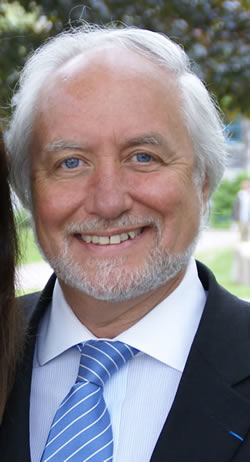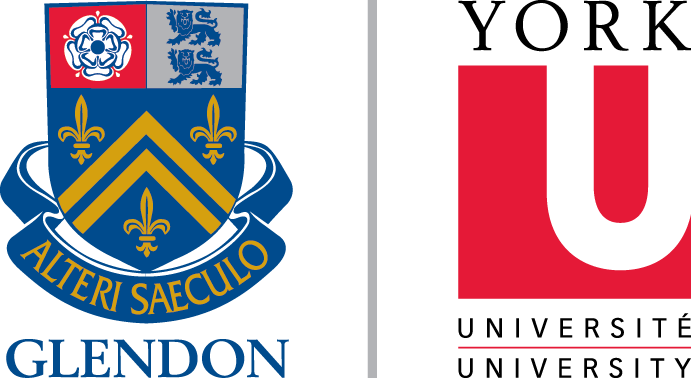 When talking with Jacques Gauthier, one quickly realizes just how passionate this French-speaking Toronto lawyer is about the law’ and about human rights. On April 9, he gave a presentation to Glendon undergraduate students at the Jean Gabriel Castel International Studies Conference on the topic “international law and the issue of Jerusalem sovereignty.” Not surprisingly, the passion that drives Gauthier came through loud and clear.
When talking with Jacques Gauthier, one quickly realizes just how passionate this French-speaking Toronto lawyer is about the law’ and about human rights. On April 9, he gave a presentation to Glendon undergraduate students at the Jean Gabriel Castel International Studies Conference on the topic “international law and the issue of Jerusalem sovereignty.” Not surprisingly, the passion that drives Gauthier came through loud and clear.
Gauthier was born in Montreal; when he was only two years old, however, his father, a senior executive with Trans Canada Airlines ‘ the forerunner of Air Canada ‘ was transferred to Paris. That’s where he would spend the next 10 years of his life, including attending elementary school. Following this Parisian decade, the entire family returned to Canada, settling in Ottawa, where he attended Carleton University and the University of Ottawa.
Thanks to the curriculum he followed in Paris, Gauthier was able to complete law school by age 21. Feeling that he was still too young to embark on a legal career, he decided to study international public law in Geneva. He finished all the coursework and tackled all the requirements for a Ph.D. in political science (international public law). In his own words, he “completed everything except the thesis” and received a perfect grade on his oral exams, which covered the whole range of international public law. When his professors in Geneva expressed their wish that he remain in their city, Gauthier made a commitment to write his doctoral thesis at a later date ‘ a promise that his wife would periodically remind him of’ He then went on to pursue his studies at The Hague International Academy.
Early Career in Toronto
Back in Canada and having been admitted to the Ontario Bar in 1976, he settled in Toronto and began his career as a lawyer. Gauthier wanted to work in the international field ‘ and also in French. His professional practice included such various areas as international public and commercial law, corporate law, commercial law, inheritance law, immigration law, human rights and language rights. Over the course of his career, he has represented a number of countries in Canada, including Mexico, Spain and France, among others. Gauthier also discovered a dearth of language tools for lawyers working in Toronto who wanted to use French.
Gauthier’s commitment to the French language in Ontario does not by any means cause him to forget that he is also a lawyer. Quite the contrary, as evidenced by the following: in 1978, he co-founded the Canadian Foundation for Children, Youth and Law (Justice for Children); from 1979 to 1981, he coordinated “La loi pour tous,” a French-language series consisting of 16 manuals and guides on Canadian and Ontario law for students and teachers. Later, he would become vice-president and, for eight months, serve as president of the board of directors of Rights and Democracy, a non-partisan organization invested with an international mandate created in 1988 by the Parliament of Canada to foster and support universal human rights values and promote democratic institutions and practices throughout the world. He also served as interim CEO for several months.
A Doctorate on Jerusalem
During this whirlwind of activities and engagements, Gauthier had not forgotten his commitment to some day write his doctoral thesis. It was the mid-1980s and he was not satisfied simply to write a thesis for its own sake and on any old subject. Rather, he was looking for a thesis topic that could make a useful and positive contribution or, in his words, a “noble” topic.
As it happened, he made a few trips to Israel and Jerusalem and, as people generally do, he had questions about the political, and especially, the legal aspects of the conflict between Israel and neighbouring Arab countries. He focused particularly on claims by both Jews and Palestinians to Israeli territory in general and on claims to the quintessentially symbolic city of Jerusalem. While searching for answers to these questions, Gauthier discovered that the basis for the claims he was hearing lacked clarity. He drew the conclusion that the historical and legal foundations of sovereignty over Jerusalem needed to be studied. In his view, no solution to the Israeli-Palestinian problem is possible without a clear knowledge of the facts, a better understanding of the historical, religious, political and legal aspects of the city and particularly of the section known as the Old City of Jerusalem.
He therefore embarked on his research to find an answer to this question. “Had I known that I was taking on a task that would last 20 years, I don’t think I would have made such a commitment’,” he admits today with a certain candour. A study on sovereignty over Jerusalem or, stated differently, “to whom does Jerusalem belong’” is a wide-ranging, profound and complicated question. His work resulted in a 1,300-page document for which he was awarded a doctorate in international law (2007) by the Graduate Institute of International and Development Studies of the University of Geneva.
Gauthier’s thesis recounts the historical origins of the idea of a Jewish state, going back to the 1896 thesis of Theodore Herzl, the 1897 Basel Conference and the promises made to the Arabs by the British in 1915. Then came the secret Sykes-Picot Agreement of 1916, the Balfour Declaration of 1917, the 1919 Paris Peace Conference, submissions by Arabs and Jews in February 1919 to the French Ministry of Foreign Affairs in Paris, and the Cairo Conference of 1921. Another important factor was the 1922 San Remo Conference, which set out the legal foundations of a Jewish state and resulted in three treaties: the Mandate for Palestine and the Mandate for Mesopotamia, which were entrusted to the British, and the Mandate for Syria and Lebanon, which was entrusted to France. The Mandate for Palestine set out and gave rights to Jews and Arabs.
In addition to these legal and historical facts, Gauthier mentioned the British White Paper of 1939 and the creation of Israel in 1948 by the United Nations, the organization that inherited the rights and responsibilities of the League of Nations. According to him, the claims of the Jewish state, i.e., of Israel, to the Old City of Jerusalem have a historical and legal basis, and, legally speaking, nothing has happened to alter Israel’s rights over this city over the decades. Moreover, he pointed out, the rights granted to Jews are protected under Article 80 of the United Nations Charter. That said, Gauthier does not want to come across as naïve. “It’s obvious that simply knowing the legal and historical facts will not be enough to solve the problems in this part of the world; the issues are highly political in nature. However, the clearest possible knowledge of the legal facts can help to clarify the issues and contribute to finding a solution,” he stated.
As a result of this thesis and the conclusions it led him to draw, Gauthier has been accused of being pro-Israeli. This is not the case, however. “I’m not a Jew; I’m a Christian,” he replies to those who impute a bias to him. He adds, “Throughout my career, I have been concerned with human rights other than Jewish human rights. Whether it’s children’s rights, Franco-Ontarian rights or human rights in China, I’ve always had a passion for the law and for human rights.”
Gauthier is still a practicing lawyer; he remains attentive to his surroundings and to the world, and to the status of, and respect for, human rights in all corners of our planet. He conveyed his passion with warmth and talent last April to the students of Glendon College.
By Michel Héroux


